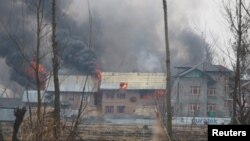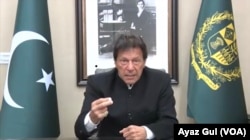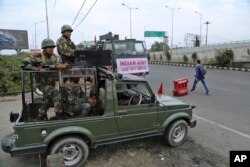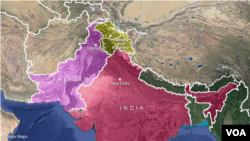India says Pakistan should “stop misleading the international community” and take action against the perpetrators of a deadly militant attack in Indian Kashmir, while Islamabad warns it will swiftly retaliate if New Delhi launches any military action.
Tensions between the two nuclear-armed rivals have escalated since a suicide bombing last week against Indian military forces in disputed Kashmir killed 40 paramilitary personnel.
India's foreign ministry said Tuesday that Pakistani Prime Minister Imran Khan has ignored claims made by the militant group Jaish-e-Mohammad that it carried out the attack. “It is well-known that the group and its leader, Masood Azhar, are based in Pakistan. These should be sufficient proof for Pakistan to take action,” the statement said.
The statement came in response to an address by Khan in which he called on New Delhi to share “actionable intelligence” linking any Pakistani to the violence. Khan also warned India against taking any military action.
“If Indians believe that they can launch an attack on Pakistan, they should understand that Pakistan would not think, but retaliate immediately as there will be no other option,” he warned.
Indian leaders have vowed to take punitive action against Islamabad, alleging the militant group behind the attack is tied to the neighboring country’s spy agency. Pakistan rejects the charge as baseless.
“We all know it’s easy to start a war but it is difficult to end it. Where it will go, God knows best. That's why I hope that better sense will prevail,” emphasized the Pakistani prime minister.
Earlier, Pakistani Foreign Minister Shah Mehmood Qureshi wrote United Nations Secretary-General Antonio Guterres, urging him to intervene and help defuse “the deteriorating” regional security situation caused by Indian military threats.
"It is imperative to take steps for deescalation. The United Nations must step in to defuse tensions,” Qureshi wrote in the letter the foreign ministry released Tuesday. He emphasized the need for New Delhi to conduct an “open and credible" investigation into the terrorist attack in Pulwama.
Pakistan's U.N. Ambassador, Maleeha Lodhi, met with Guterres in New York Tuesday and tells VOA dialogue is the only way for India and Pakistan to resolve all outstanding issues, especially Jammu and Kashmir.
"This issue is one of human rights. This issue is one of denial of self-determination to the people of Kashmir, And you know, every time there is a civilian life lost in the occupied territory, it is not just another statistic. It is somebody's sister, mother, brother, child who dies. And with that death of martyrdom, every Kashmiri dies a little and so do we in Pakistan," she said.
India and Pakistan have fought three wars -- two over Kashmir -- since they both gained independence from Britain in 1947. The disputed region is at the center of tensions and there are fears another war between the two rivals could escalate into a nuclear exchange.
The Indian government has suspended already limited trade and economic links with Pakistan and reports say authorities have asked Pakistani students studying in India to leave the country.
Pakistani foreign ministry spokesman Mohammad Faisal condemned Indian authorities for ordering visiting Pakistanis to leave the state of Rajasthan in 48 hours and prohibiting hotels from accommodating them.
The tensions in South Asia have flared up at a time when the United States has initiated a dialogue with the Taliban to try to promote a political settlement to the war in Afghanistan.
Islamabad has arranged the peace process and President Donald Trump announced earlier this month that if talks with the Taliban achieve progress he would consider an American troop drawdown in Afghanistan.
Pakistani officials said Tuesday that tensions with India would undermine the U.S.-led Afghan peace process.
“Pakistan is playing a very important role in contributing towards the Afghan peace process such an incident will in a way also affect the ongoing efforts of Pakistan,” Zahid Nasrullah, Islamabad’s ambassador to Kabul, told reporters.
Washington acknowledges Islamabad’s support for the peace process, given Pakistan’s influence with the Taliban. Chief U.S. negotiator, Zalmay Khalilzad, is scheduled to meet with Taliban interlocutors in Qatar next week in his bid to pave the ground for a jumpstarting an intra-Afghan peace process.







